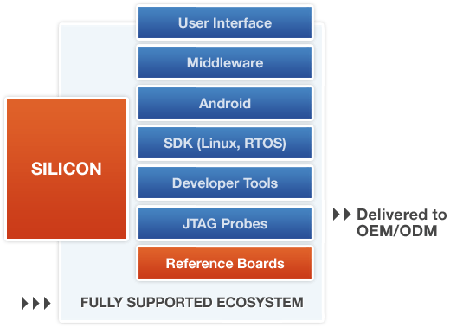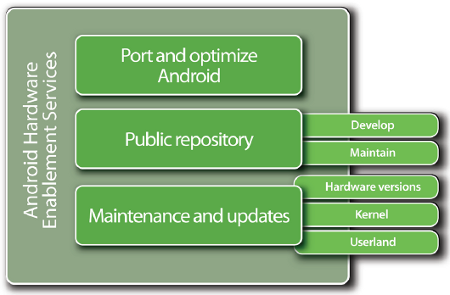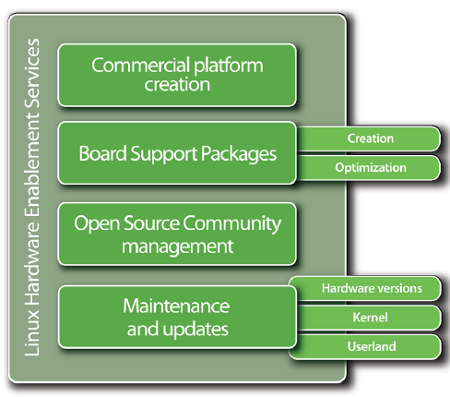Linux/Android dev tools gain services program
Jul 26, 2011 — by Eric Brown — from the LinuxDevices Archive — 3 viewsMentor Graphics has repackaged its embedded Linux and Android development platforms and services into an “integrated enablement program” for hardware companies. The Mentor Embedded Hardware Enablement Program provides services and training for embedded Android and Linux platforms, as well as Sourcery open source tools, Inflexion UI creation tools, and vertical market solutions, says the company.
The Mentor Embedded Hardware Enablement Program (MEHEP) appears to be more about integrating Mentor Graphics products and services than introducing any new products. That said, the packaging may well prove beneficial to hardware companies looking for vertical market solutions and for Android and Linux embedded development platforms that are backed up with services and training, integrated UI toolsn and GNU toolchain.

MEHEP conceptual diagram
C2, for example, says it has made use of Mentor's well-established OS porting expertise to port Android to its Jazz 2 family of RISC processors, aimed at "Smart STB" (set-top box) applications.
Meanwhile, it's news to use that IBM is using Mentor's services to offer Android on its hardware partners' PowerPC-based devices.
"These offerings from Mentor Graphics will help bring the Android operating system to our PowerPC partners, giving solution providers a proven embedded platform for use in a range of innovative new devices, from tablet computers to digital televisions," stated Elmer Corbin, director of IBM's Custom Processor unit.
The Mentor Embedded Hardware Enablement Program enables hardware vendors to create an efficient software ecosystem by providing common tools and embedded Linux and Android reference platforms, says Mentor Graphics. The latter are said to be available in both free and commercially supported formats.
In addition, MEHEP is said to include support for platform development on bare metal, other open source operating systems, GNU toolchain services, and embedded UIs. MEHEP also supports real-time operating system (RTOSes), presumably starting with Mentor's own Nucleus RTOS.

MEHEP Android services
- Android offerings — Mentor offers no formal name for its Android platform, which first emerged in July 2009 when it acquired Embedded Alley, along with its MIPS and PowerPC Android ports. The MEHEP services support the creation, optimization, and maintenance of full-featured Android environments, says the company. This includes the creation and maintenance of a public repository, the fostering of an OEM community around that repository, and Android training.
- Linux commercial platform — The Linux services are built around the Mentor Embedded Linux development platform, which came out last fall in a free "Essentials" version to join its "fully compatible" commercial version. The Linux services package supports creation for hardware targets, board support package (BSP) development, optimization, open source community management, platform maintenance, support, training, engineering services, and maintenance, says the company.
Linux services also include performing updates to the kernel, userspace, and toolchain in the "no cost" version, as well as updates to Linux commercial support for specific hardware consistent with Mentor Embedded Linux releases, says Mentor. In addition, MEHEP provides community updates to keep BSPs supported in community trees.
 MEHEP Linux services
MEHEP Linux services
- Sourcery toolchain — MEHEP further integrates the Sourcery tools the company received when it acquired CodeSourcery last December. Sourcery services support its open source GNU, GCC, Eclipse, and low-level virtual machine (LLVM) toolchain, says Mentor Graphics. Services are said to be available to develop code for specific hardware architectures, including porting, custom and commercial software development kits (SDKs), optimized performance libraries, analysis tools, and JTAG probes.
- User interface product and design services (Inflexion) — The UI offerings are said to streamline the development of 2D, 2.5D and 3D graphics, animation, and special effects for customized products. The services are built around Mentor's Inflexion UI tools, which were first announced for its Nucleus RTOS in 2007.
Inflexion has since been introduced in a Linux version that was used, for example, in Freescale's i.MX53 Quick Start board for Linux and Android. Inflexion also showed up recently as part of an Android BSP for Atmel's ARM9-based SAM9G45 and SAM9M10 processors.
- Vertical platform services — Mentor will deliver a range of firmware, OS, middleware, applications, and UI development services for existing hardware to support specific vertical market requirements. Supported solutions are said to include in-vehicle infotainment (IVI), smart energy, and retail applications.
Mentor Embedded Linux background
Embedded Alley had already released its first embedded Linux development platform before the company was acquired by Mentor Graphics in June 2009. The Embedded Alley Development System for Linux was released in December 2008.
In May of 2009, the platform was updated with tools to track open source components, as well as support for Freescale's ARM11-based i.MX31 processor. In October 2009, the Mentor Graphics Embedded Software Division announced an Android port to the PowerPC architecture, initially targeting Freescale's PowerQUICC III MPC8536E processor. This was followed by a partnership deal with Freescale covering its PowerPC-based PowerQUICC and QorIQ processors.
Mentor Graphics has continued Embedded Alley's strong relationship with MIPS, as well as with RMI, a manufacturer of MIPS-based processors that was later acquired by NetLogic Microsystems. In early 2010, Mentor and NetLogic Microsystems announced an agreement to spin a version of Mentor Embedded Linux for NetLogic's MIPS-based XLP, XLR, and XLS multicore SoCs.
Mentor Graphics also offers an Android development kit for the Texas Instruments (TI) OMAP35x SoC family, among other offerings.
Availability
The Mentor Embedded Hardware Enablement Program is available to hardware vendors today, says Mentor Graphics. More information may be found at Mentor's MEHEP site.
This article was originally published on LinuxDevices.com and has been donated to the open source community by QuinStreet Inc. Please visit LinuxToday.com for up-to-date news and articles about Linux and open source.